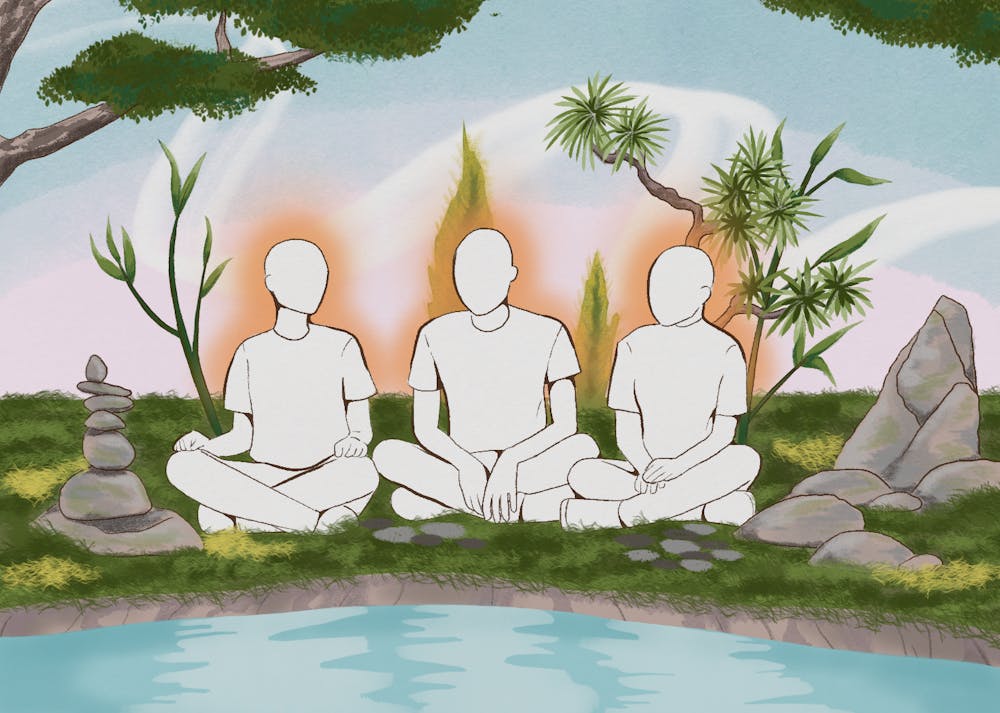Facing outward in a circle sitting on zafus, a round cushion, a group of students sit silently as they further their enlightenment with meditation.
Every Tuesday, the Zen Devils Student Group, gathers in the Mecha Room in the Memorial Union to discuss a quote from notable Buddhists, koans, practice meditation and explore topics of beauty, existence and enlightenment.
Established in 2021, the club focuses on self-realization using the basic tenets of American Zen Buddhism. The group meditates after discussing the quote and koan — similar to a riddle or paradox used to open the mind to different ways of thinking.
READ MORE: Self-care as a commodity in students' lives
"I just love the community that we have within the club and (I) have made a lot of friends over the years," said Zen Devil club officer, Ariel Carlson, a junior studying urban planning.
With roots in India, Zen Buddhism further developed in China and Japan around the 13th century and later was popularized in the United States during the California Gold Rush in the mid-19th century.
Zazen, seated meditation, is known for its simplicity and emphasis on the natural world. In traditional Buddhism, meditation is used to seek enlightenment. In Zazen, meditation is used to show one is already enlightened.
Andre Martinez-Jackson, a freshman studying neuroscience, said meditation is an eye-opener.
"It helps me experience the world with a more open mind and be aware in the moment," Martinez-Jackson said. "That leads to many opportunities."
While sitting on zafus, a round cushion used to help posture during meditation, the group meditates based on Zen Buddhism guidelines. For eight minutes, members detach themselves from their thoughts and prevent their brains from focusing on anything else.
"When practicing Zen Buddhism, you get a picture of systems," Martinez-Jackson said. "You see the process — how things evolve and take shape. You can use that knowledge of observance to apply yourself further."
"Not knowing," "bearing witness" and "taking action" are the most common and practiced tenets among Zen Buddhists.
"The idea of meditation is that you recover quickly from thinking to not thinking," said Blake Davis, a senior studying mathematics. "You want to not think, but want is hard."
Through the club's meetings and guest speakers, members have learned how to let go of the past and the future.
READ MORE: The calming influence of crochet: How ASU students find relief from stress in the craft
During an October meeting, Sogen Charles Billingsley, the director of the Haku-un-ji Zen Center located in Tempe, said "You give yourself so true to the moment, you can become the moment," — a sentiment which Martinez-Jackson held on to.
Using this advice and weekly practices, Martinez-Jackson has been able to gain new experiences in college.
"Ever since I have gone to college, I have been trying to open my mind," Martinez-Jackson said. "This is perfect because it gives me a structure on how to achieve that."
Before coming to the meeting, Lucas Hardesty, a freshman studying materials science and engineering, learned about Buddhism from his parents who were Taoists. Martinez-Jackson invited Hardesty to his first Zen Devils meeting.
"It makes you realize you are one piece in a giant machine that has billions of parts, and you have your specific role," Hardesty said.
Practicing Zen Buddhism is about observing yourself and your behaviors as a person with respect to how that fits into "society and social norms," Hardesty said.
As the semester continues, the student group has planned several events including Blackout Poetry Night and Teatime in November for returning and new members. All of the events aim to expand the practice and education of Zen Buddhism within the ASU community.
"If you do this, there is a likelihood you will become more open-minded, aware, more present (and) just make you a better human and experience more of the world," Martinez-Jackson said.
Edited by Grey Gartin, Jasmine Kabiri and Caera Learmonth.
Reach the reporters at glmcfar1@asu.edu and follow @ginia_mcfarland on X.
Like The State Press on Facebook and follow @statepress on X.
Ginia is a junior studying journalism and mass communication with a minor in criminology. This is her third semester with The State Press. She has also worked at Arizona Capital Times and KTAR News.




